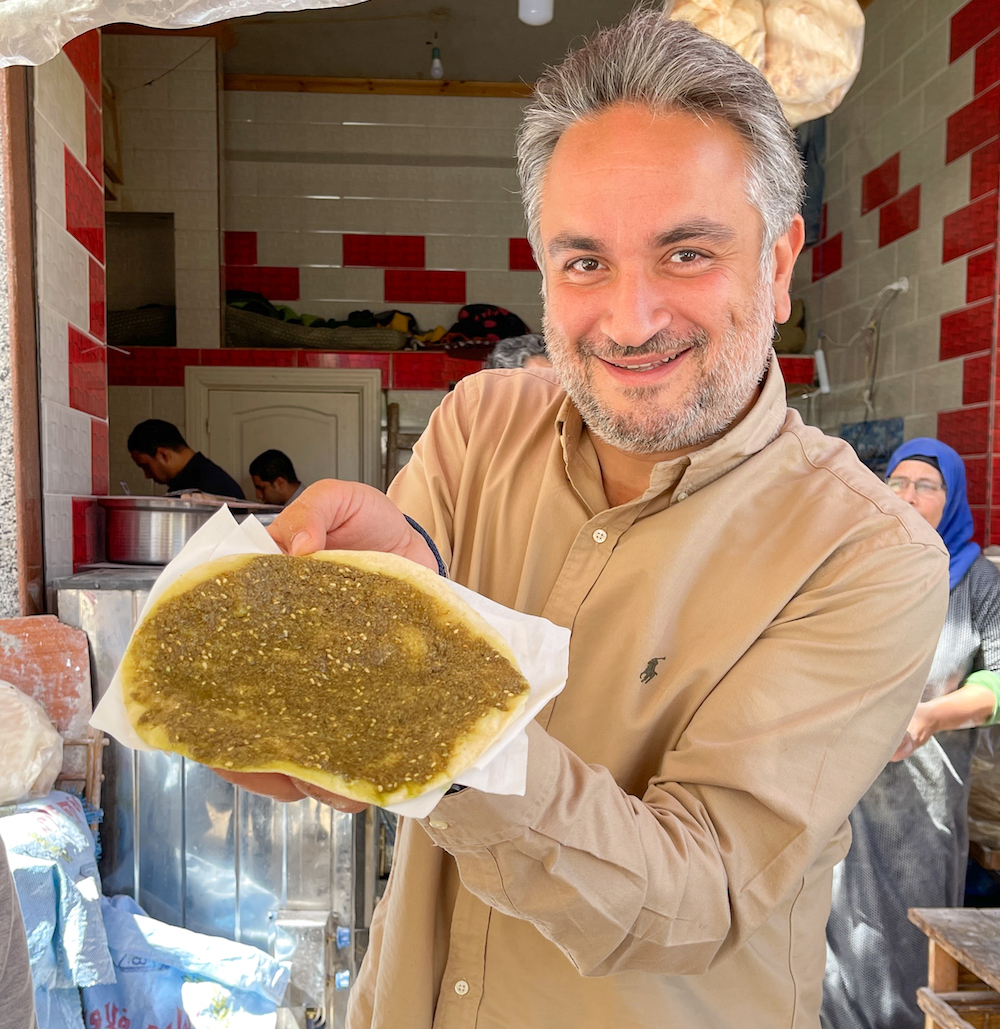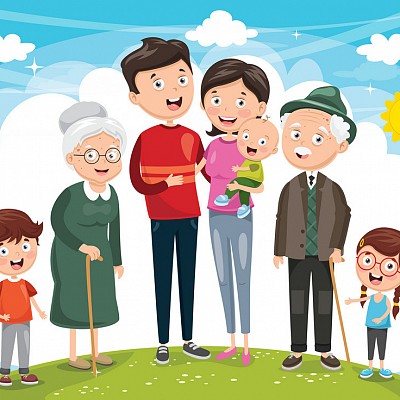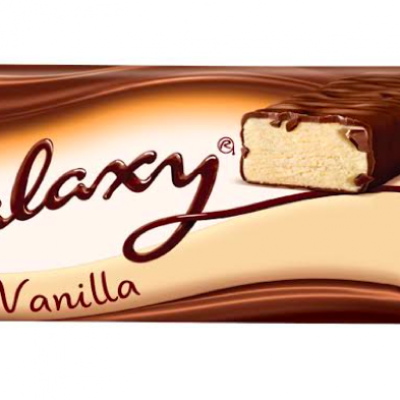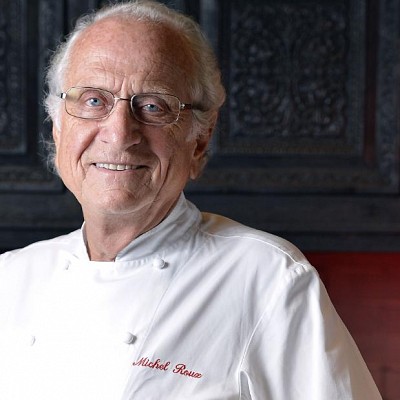Lebanon’s demise has turned food blogger Anthony Rahayel into an unlikely protagonist in the fight for its future.
Beirut, Lebanon – Anthony Rahayel’s work is guided by a simple premise he has repeated like a mantra in hundreds of online videos over the years: “Lebanon is the most beautiful country in the world.”
It was a brave assertion even before Lebanon’s terrible downfall over the past year or so.
Now, after the country suffered one of the world’s worst financial implosions coupled with one of the largest non-nuclear explosions, the statement seems to border on the ludicrous.
But Rahayel’s views are intentionally out of step with Lebanon’s recent public image. The boundlessly optimistic food blogger sees himself as an ambassador for the real Lebanon, “Lebanon as not seen on TV or in the news”, as he puts it.
Read his reviews, published on his blog No Garlic No Onions, or watch his videos on YouTube and you will indeed see a very different perspective; one where Lebanon’s God-given potential to be a tourist haven could soon be realised; where the rich community spirit and heritage of the Lebanese trumps their degrading, divisive politics; where food is served neither too hot nor too cold, nor too salty, nor too sweet.
For the many thousands in Lebanon who watch him regularly, Rahayel’s videos are an escape from the pain of the country’s demise or, at the very least, helps soothe their discomfort.
For viewers in the large Lebanese diaspora, his daily excursions across the country stir a deep yearning for the tastes and smells of home – a filtered, more perfect version home they can live vicariously through him.
Rahayel embodies and promotes certain cliches about Lebanese – including their famed resilience in overcoming seemingly insurmountable crises and their creative, entrepreneurial spirit.
He is a man intent on cleaning Lebanon’s image, and generally making it more livable. He is not a rebel, nor even mildly interested in politics.
Still, life in his country has become so harsh that his telling of the story of Lebanon, “the most beautiful country in the world”, often feels like a critique of how bad things have gotten. Today, it is impossible to appreciate Lebanon’s great food, breathtaking nature, and the storied past of its inhabitants without thinking of the feckless political leaders who threaten the very existence of all of it. With that comes a call to action.
And that makes Rahayel an unlikely protagonist in the fight for Lebanon’s future.
“Why do it? I love it. It’s a mission, it’s a statement, it’s a passion, it’s making Lebanon a better place by spreading positivity,” he says.
‘When they go negative, I go positive’
Originally from Beirut’s eastern Achrafieh neighbourhood, Rahayel spent most of his childhood in the mountain village of Feytroun, some 33km (15 miles) north of Beirut.
Born in 1983 at the height of Lebanon’s civil war, he went to school and played outdoors between rugged forest and limestone boulders. He joined the scouts, and credits his passion for food, nature and storytelling to long summer days spent hiking over mountains, and to nights sitting around the campfire.
His grandfather was a dentist, as was his father, and Rahayel too chose that profession and worked in the field for about 10 years, before taking up his passion for food.
In 2012, he launched No Garlic No Onions, a review blog named after his serious allergy to both vegetables, which happen to be staples of Levantine cuisine. “The idea was fighting corruption – to write honest reviews when everything else was paid for,” he said in an interview.
In 2014, he began filming his reviews and got into the kitchen, shadowing chefs who cooked traditional Lebanese food that most Lebanese had only ever seen made by their mothers or grandmothers.
With a gleaming smile that deepens the dimples on his rounded face, he glorified Lebanese cuisine as the best in the world, proclaimed those who cook it heroes, and said Lebanese should be proud of what their country has to offer.
He did so as the war in neighbouring Syria spilled into Lebanon, with a spate of bombings and successive waves of clashes between supporters and opponents of the Syrian regime, who were also largely followers of different religious sects and inhabitants of different areas.
As his videos picked up viewership, he launched initiatives that took people from one side of the country to another, usually across lines of political-religious influence, including between Tripoli, a stronghold of support for the Syrian revolution, and Baalbeck, a city whose inhabitants sent hundreds to fight with Hezbollah alongside the regime. Little was said about politics, lots was said about food, and common ground was found, if sometimes tenuously.
In 2016 he travelled through multiple army checkpoints to Lebanon’s remote northeastern town of Aarsal, the outskirts of which were occupied by the armed groups ISIL (ISIS) and Jabhat Fatah al-Sham.
“I was wearing a Ferrari Jacket,” Rahayel says with a broad smile. “We stopped at six or seven places and I got on the news that night. They asked me ‘what did you see?’ I said manakesh,” he says, referring to the Levantine flatbread usually topped with local thyme or cheese.
“They asked, ‘no one shooting?’ I said ‘the people are amazing.’ They would pull me to the negative and I’d go positive.”
As Anthony rises, his country fails
In 2018, he paused his dentistry work to focus entirely on food and hospitality. Rahayel wakes up at about 5am, often seven days a week, and drives across the country, rarely returning home till after night has fallen.
“You can’t love something if you don’t know it,” he says. “People sitting in Beirut all the time really don’t know Lebanon well.”
He won World Street Food Blogger of the Year at the World Blogger Awards in Cannes, France, in 2019, and World’s Best Expert Food Account in 2020, and characterises both victories as wins for Lebanon.
While Rahayel succeeded, his paralysed country failed. Years of top-level corruption and incompetence by the country’s leaders came to bear in October 2019, when an economic downturn led to a hopeful nationwide uprising that sought to overthrow the political class.
They did not budge. Protests devolved into riots, and were then all-but extinguished by the coronavirus pandemic and the country’s worst-ever economic crisis.
The local currency lost more than 80 percent of its value against the dollar. Poverty rates have exceeded 50 percent. More than half the population worry about food security, according to the World Food Programme, and Human Rights Watch has said millions could face hunger.
If Rahayel’s videos once portrayed a selectively positive image of the country, the abject negativity of the past year and a half has since found its way in.
“Tell me about what you do,” he asked the owner of a small Lebanese bakery in the coastal town of Halat in a video from last summer. “Well, I’m still open,” she says flatly.
In another video, the octogenarian owner of a traditional foul (fava beans) and hummus (chickpeas) shop notes how the price of butter has increased more than threefold. “It goes up every time the dollar [exchange rate] does,” he laments. The portions he prepares for Rahayel are smaller than before. An unspoken heartbreak hangs over their conversation.
“Of course it’s very hard what people are going through,” Rahayel says, adding the deteriorating situation has only compounded the responsibility he feels to keep the spirits of his viewers as high as possible.
“I never deflate, I say, ‘what’s next?’ I always try to see the glass half full because people tell me that if I lose hope or leave the country, they will leave too.”
The biggest test
Rahayel’s fans saw him in a way they never had before on August 5 last year, the day after Beirut was eviscerated by a massive explosion that killed 200, injured more than 6,000, and left some 300,000 homeless.
The morning after the blast, he was driven on the back of a motorbike through Greater Beirut, live-streaming the destruction of the city he loves. He did so in absolute and uncharacteristic silence, for an hour and a half.
Near the end of his stream, he arrived at a building in the city’s devastated Achrafieh neighbourhood and took the lift up to his office, put his key in the door and opened it.
A glass wall was ripped clean from the brickwork, leaning forward precariously. He began to cry softly behind the camera.
“No way!” he says, as he peered into a main room from underneath a collapsed chunk of ceiling.
The camera pans to glassless windows, floors covered in shards, a large model sailing boat keeled over onto the ground, fallen metal shelves that lay amid a clutter of small figurines and mementoes he had picked up over years of work. Scores of snow globes that sat opposite a breached window remained miraculously intact.
The office, a colourful testament to his radiant character, was wrecked.
Rahayel turned the camera around to his face. “I’m going to stop now to take some pictures here and maybe we’ll keep going and I’ll show you downtown Beirut,” he says. His eyes trail from the screen to the damage around him. “Just so I can digest what happened a bit. Goodbye.”
With the camera off, he found a small toy digger lying by the debris, placed a toy bulldozer next to it, and snapped a picture. “Then I knew it was time to rebuild,” Rahayel says.
The next day, he was in central Beirut distributing hundreds of manakeesh to those affected through his charitable initiative Kol w Taame, or “Eat and Feed.”
Money for that aid, much of it sent to him by viewers in the diaspora, kept flowing and Rahayel says he distributed 850 million Lebanese pounds (roughly $100,000 at the market rate) worth of assistance to people over the course of the year.
And, with help from his wife Nell, he rebuilt his office. It was unveiled in his last video of 2020, a big smile painted by its main door, dubbed “happiness headquarters”.
Despite all he and his country went through, Rahayel says 2020 “was one of the best years of my life because I learned so much. It was hard but I didn’t let it become a negative thing and pull me down, I always kept going.”
On the road
Four months after the blast, Al Jazeera accompanied Rahayel and his crew, videographer Kareem Kawtharani and friend and sometimes-producer Elias Sarkis, on a trip to Lebanon’s mountainous northern Koura region, famous for its dark green olive groves.
The day begins with manakeesh, his absolute favourite thing, at Nakroucheh Bakery which opened after its owners lost their jobs during the economic crisis and successive COVID-19 lockdowns.
“We were all employees, as you know. Now there is no work. We make these at home anyway so we said let’s make it for the people,” said the owner, a middle-aged woman with deep turquoise eyes. Even in the short time since her bakery opened, the cost of basic goods changed so much that the prices of menu items had been written over, erased, crossed out and replaced.
Rahayel was in his element, accompanying the bread in flawless flow from prep station to the oven, filming it rise, and all the while asking about her products: small savoury pastries with Zaatar (thyme), cheese or muhammara, a paste made of red bell pepper, walnuts and pomegranate molasses; Kaak, a purse-shaped sesame coated bread; and a meter-long five-flavour flatbread that is, as Rahayel puts it, “very Instagramable”.
That morning, the winner was a calzone-like sugar pie. Ultrathin layers of dough are individually sprinkled with sugar and rubbed with ghee, folded, and then put in the oven.
The finished product has a crispy-caramelised exterior that, when bitten, releases an opulently gooey syrup. “Listen to the crunch!” Rahayel says, biting into the pie in the morning sun outside the bakery.
Next, he heads to a producer of traditional soaps deep in the Koura mountains. He obsesses over individual bricks stacked in a DNA-like spiral, the traditional method for curing soap. He takes viewers into an old room and gets excited about its old cupboard and rusty utensils, including a dial scale. From olive soap, he heads to an olive grove, overjoyed to see a large machine with an outstretched arm that shakes trees to remove their fruit more efficiently.
“It’s one of those days,” he says, excitedly placing his phone under the branches to catch the falling olives in slow motion.
Later, at a large olive-oil producing factory, he puts on the showmanship. In mock-astonishment, he opens the door to the state-of-the-art factory and exclaims, “We have something like this in Lebanon?”
“It’s about showing that we can do anything, it’s about promoting all these Lebanese heroes for free – for super-duper free, which no one else does,” Rahayel explains as he waits for the olive press to begin churning out neon-green virgin oil.
It is time for lunch and Rahayel heads down to one of his favourite places, a nondescript fisherman’s restaurant near disused salt pans in the scenic coastal town of Anfeh. Girgi al-Dayaa, or “Girgi of the Village”, is named after its owner.
True to his fisherman roots,Girgi is big-hearted, raucous and foul-mouthed, alwayswitharak – the high alcohol anise-flavoured local drink – in hand. His restaurant’s walls are lined with images of creatures he has wrestled from the sea over the years on his small traditional boat, known asafluka.
Rugged Girgi and manicured, composed Anthony are a wonderfully mismatched duo, the former extracting guttural laughs from the latter as he ruins video sequences with crude language.
The food comes fast: fish fatteh composed of fried baby sardines, dried curls of bread and tender chickpeas covered with warm yoghurt that is brought to life with sizzling pine nuts and almonds; battered shrimps two ways; stuffed roasted calamari; a baked seafood ratatouille with succulent eggplant; slow-cooked fish in shawarma spice; local sashimi; a whole octopus baked crimson red and smoking grilled Dorade extinguished with the holy trinity of olive oil, garlic and lemon.
Golden light streams through the window. Lots of arak is had. The great Lebanon of Rahayel’s idealism does not feel so illusory after all.
Source: AL JAZEERA






































